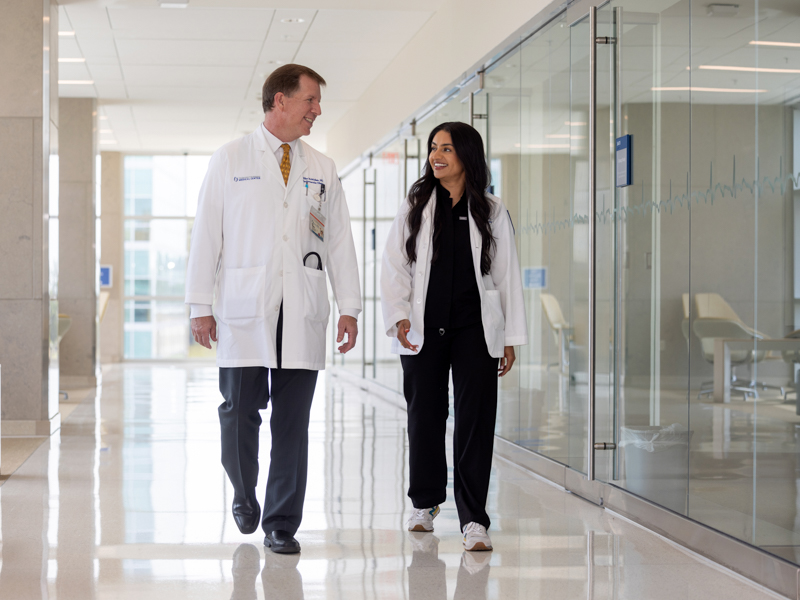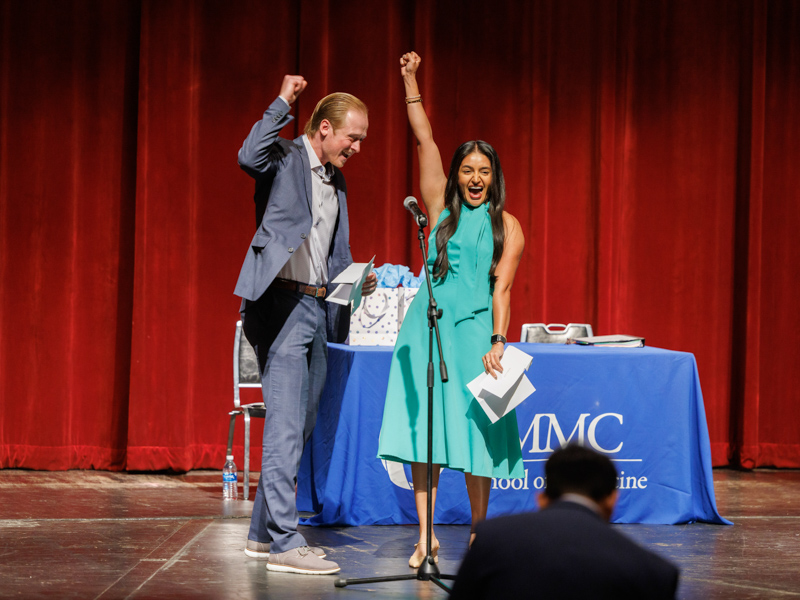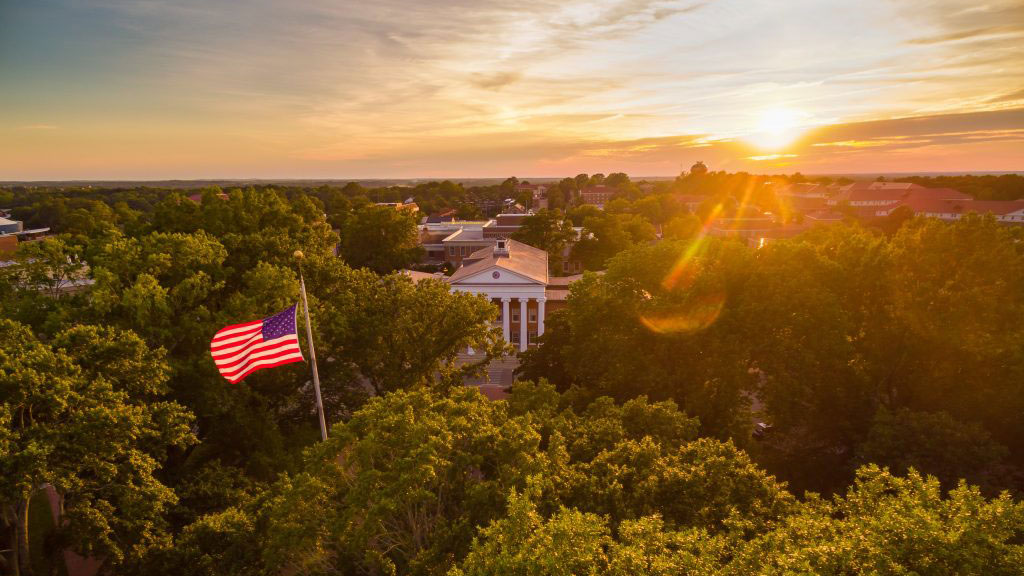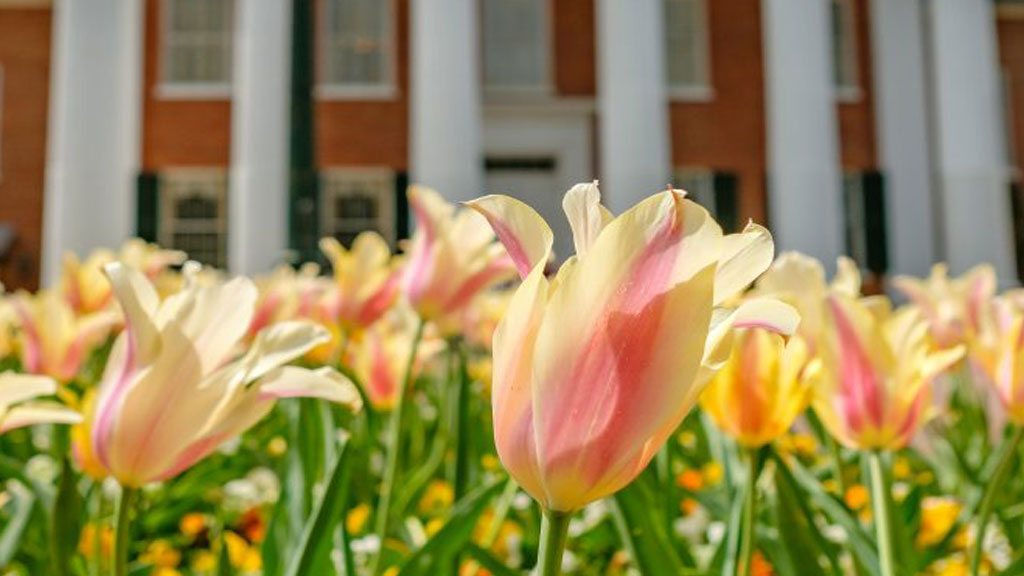It was years before Ruhi Randhawa learned the truth about her heart – and herself.
As for her heart, it had a hole in it when she was born. Or so she thought. As for herself, she wasn’t smart enough to become a doctor. Or so she thought.
Before she was two, surgery conquered her actual birth defect; she was in her twenties before she mastered her own doubts.
Now, on May 26, commencement day for the University of Mississippi Medical Center, Randhawa will receive her medical degree, a wish-come-true fueled by a childhood fascination with the story of her heart.
“I wanted to become a doctor ever since I first saw my electrocardiograms,” she said. “I was four or five.”
Ruhi Randhawa
Born in Batala, India, Randhawa was a one-year-old when her parents immigrated to the United States for her medical care.
“The doctors in India said they were unable to do the surgery I needed and my parents should take me to America, if they could,” Randhawa said.
Because relatives were already in California, her parents took her there. Her surgery was at Children’s Hospital of Oakland. “It’s a testament to modern medicine that I’ve been able to live a normal life,” she said.

In California, her doctors tried describing to her parents what had afflicted Ruhi’s heart. “English is my parents’ second language,” she said. “What they understood is that I had a heart condition and I needed an operation.”
She grew up believing she had a ventricular septal defect: a hole in the heart, in the wall separating the two ventricles.
“I didn’t know what my real diagnosis was until my second year of medical school,” she said.
By then, the family was in Mississippi. Her dad, the late Sukhwinder Randhawa, was a long-haul truck driver; while on the road, he found a gas station for sale in Bolton. He bought it and moved the family to nearby Clinton when Ruhi was 11.
For the first 11 years of her life, she was in and out of doctors’ offices frequently. But she wouldn’t see a cardiologist again until she was 21.
During that gap, her dream of becoming a physician dissolved; it seemed as imperfect as her heart had once been. “I wasn’t sure I would be smart enough to get through medical school,” she said.
“I knew nursing was a great career and, to be honest, I wanted a guaranteed job right after college. I’m not from a background that is well-off financially. So, I decided to go to nursing school.”
She took her degree from Mississippi College to Mississippi Baptist Medical Center, working there for four years. She had such a great time being a nurse, she said, she decided she still wanted to be a doctor.
“Being a nurse was an amazing experience. I became so interested in how the physicians took care of patients, why they prescribed certain drugs and their vast body of knowledge. This solidified that I wanted to be a doctor and learn even more about the human body.
“It was hard for me not to say, ‘Hey, I want to do that, too.’”
She applied to one medical school. “Which was a gamble,” she said. “Medical school is extremely hard to get into. But I wanted to stay here in Mississippi where the health status is low in so many areas.”
It was 2019. It had been some 20 years since she saw her first electrocardiogram and looked into her heart; and now, at UMMC, she was a medical student – and wondered if she should be.
“That transition from nursing to the M1 year was difficult,” Randhawa said. “It was the overwhelming amount of work that first semester. Sometimes I felt like I was always trying to catch up.”
“And there was that constant imposter syndrome. You just don’t feel that you’re as smart as your classmates. I’m here 24/7 studying, while it seems that everyone else didn’t need to study as much. It was a new balancing act for me.”
During the second semester of her M1 year, her equilibrium recovered. “I had a lightbulb moment; it took me back to being a nurse,” she said. “It made sense to me now. It was a knowledge base I already had; I was looking at something many of my classmates had never seen.”

It was an electrocardiogram. That was all it took to restore her faith in herself. That, and this: “I was complimented on my bedside manner by attending physicians; that gave me confidence that I was supposed to be here.”
And one more thing: Rajinder “Pinki” Randhawa. “My mom. She moved to the United States when she was in her twenties,” Randhawa said. “She brought over a sick baby – me. But she was able to get me the care I needed.
“As I grew older, she was my biggest champion and never once said, ‘You can’t do this.’ The main reason I’m alive today is my mom – and the doctor who operated on my heart; I should give him credit, too.”
But the operation wasn’t for a hole in her heart. “I found out my M2 year,” Randhawa said. “During our cardiology block in pathology, we learned about a certain condition, so I thought about requesting my records from Oakland Children’s Hospital. When I did, I received a 200-page document containing my entire pediatric medical record.
“That’s when I saw the official diagnosis, the entirety of my hospital stay and my open-heart surgery — which now made a lot more sense because I was better versed on the subject matter.”
The subject was Tetralogy of Fallot, a rare condition caused by a combination of four heart defects present at birth. It does have a fairly well-known effect, however: “I was a ‘blue baby,’” Randhawa said, referring to the blue-tinged skin that usually accompanies the disorder.
By then, she was seeing Dr. Michael McMullan, professor of medicine, division director for cardiology and associate dean for student affairs. Along with Dr. William Campbell, associate professor of medicine at UMMC, McMullan is one of only two adult congenital cardiologists in the state; he was also Randhawa’s dean for her residency application.
“To me, nurses make the best doctors,” McMullan said. “They know how to give hands-on care, to meet patients’ needs. With Ruhi, you also have a doctor who’s been a patient; she has that perspective, too. I believe she’ll make a fantastic doctor.”
Unfortunately, for McMullan’s druthers, she won’t be a fantastic cardiologist. Randhawa will train at UMMC, in anesthesiology, a residency McMullan helped her secure.
“I miss bedside nursing, the hands-on approach it allows,” said Randhawa who couples-matched with partner Matthew Pinto. “In anesthesiology, you’re also one-to-one with your patient – starting their IVs, being with them at such a vulnerable time when they’re entrusting their lives to you. It’s the kind of direct patient care I received.”
She still receives it; she must be monitored for the rest of her life, and McMullan is happy to be her monitor.
“She’s just one of the most genuine, sincere people I’ve met,” he said. “She not only has a repaired heart, she also has a kind heart. I’m glad she’s staying here.”
By Gary Pettus, University of Mississippi Medical Center



